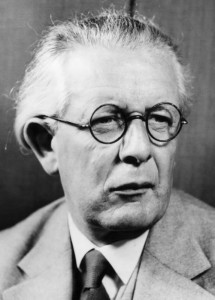Swiss child psychologist Jean Piaget distinguishes the language and thought processes of children from adults as he develops an influential theory of child development.

Swiss child psychologist Jean Piaget distinguishes the language and thought processes of children from adults as he develops an influential theory of child development.

What is the reason for this? It is, in our opinion, twofold. It is due, in the first place, to the absence of any sustained social intercourse between the children of less than 7 or 8, and in the second place to the fact that the language used in the fundamental activity of the child—play—is one of gestures, movement and mimicry as much as of words. There is, as we have said, no real social life between children of less than 7 or 8 years. …
If language in the child of about 6 1/2 is still so far from being socialized, and if the part played in it by the ego-centric forms is so considerable in comparison to information and dialogue, etc., the reason for this lies in the fact that childish language includes two distinct varieties, one made up of gestures, movements, mimicry etc., which accompany or even completely supplant the use of words, and the other consisting solely of the spoken word. Now, gesture cannot express everything. Intellectual processes, therefore, will remain ego-centric whereas commands etc., all the language that is bound up with action, with handicraft, and especially with play, will tend to be become more socialized. …
Ego-centric thought and intelligence therefore represent two different forms of reasoning, and we may even say, without paradox, two different logics. By logic is meant here the sum of the habits which the mind adopts in the general conduct of its operations–in the general conduct of a game of chess, in contrast, as Poincare says, to the special rules which govern each separate proposition, each particular move in the game. Ego-centric logic and communicable logic will therefore differ less in their conclusions (except with the child where ego-centric logic often functions) than in the way they work.
Piaget, Jean. 2001. The Language and Thought of the Child. London: Routledge. pp. 38-47. || Amazon || WorldCat